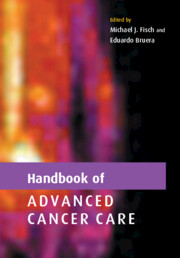Book contents
- Frontmatter
- Contents
- List of contributors
- Preface
- Acknowledgements
- PART I General concepts in oncology
- Part II Primary tumors
- Part III Management of specific symptoms and syndromes
- 41 Assessment of pain
- 42 Drugs for managing cancer pain
- 43 Difficult pain management problems
- 44 Dyspnea
- 45 Loss of appetite and weight
- 46 Fatigue
- 47 Depression and anxiety
- 48 Delirium
- 49 Constipation
- 50 Palliation of fever and sweats: the heat is on!
- 51 Bleeding in advanced cancer patients
- 52 Thrombosis
- 53 Hypercalcemia of malignancy
- 54 Lymphedema
- 55 Wound care of the advanced cancer patient
- 56 Infections in patients with advanced cancer
- 57 Urogenital complications
- 58 Brain metastases
- 59 Bowel obstruction
- 60 Bone metastases
- 61 Meningeal cancer
- 62 Pleural and pericardial effusions
- 63 Superior vena cava syndrome
- 64 Chronic nausea
- Index
- References
51 - Bleeding in advanced cancer patients
Published online by Cambridge University Press: 04 August 2010
- Frontmatter
- Contents
- List of contributors
- Preface
- Acknowledgements
- PART I General concepts in oncology
- Part II Primary tumors
- Part III Management of specific symptoms and syndromes
- 41 Assessment of pain
- 42 Drugs for managing cancer pain
- 43 Difficult pain management problems
- 44 Dyspnea
- 45 Loss of appetite and weight
- 46 Fatigue
- 47 Depression and anxiety
- 48 Delirium
- 49 Constipation
- 50 Palliation of fever and sweats: the heat is on!
- 51 Bleeding in advanced cancer patients
- 52 Thrombosis
- 53 Hypercalcemia of malignancy
- 54 Lymphedema
- 55 Wound care of the advanced cancer patient
- 56 Infections in patients with advanced cancer
- 57 Urogenital complications
- 58 Brain metastases
- 59 Bowel obstruction
- 60 Bone metastases
- 61 Meningeal cancer
- 62 Pleural and pericardial effusions
- 63 Superior vena cava syndrome
- 64 Chronic nausea
- Index
- References
Summary
Bleeding is a common presenting problem at the time of initial diagnosis in several types of cancers. It is less frequent in the palliative care setting and has been estimated to affect 6–10% of patients. Although they are less frequent, these bleeding events can be frightening and dramatic for the patients, their families, and healthcare professionals, especially if the hemorrhaging is massive.
Clinical approach
In the palliative care setting, management of bleeding requires consideration of many factors. The clinician has not only to consider the underlying cause, the clinical presentation, and the severity of the event, but he also needs to take into account other salient factors such as the setting of care, the availability of various resources, the overall disease burden, the life expectancy, the patient's overall quality of life, and the wishes of the patient and family.
Malignancies involving the upper and lower gastrointestinal tracts, lungs, kidneys, bladder, and female genital tract can produce massive bleeds that present as hematemesis, hematochezia, melena, hemoptysis, hematuria, and vaginal bleeding, respectively.
These hemorrhages can result in catastrophic events that may cause hypovolemic shock and are immmediately life threatening. They can also give rise to chronic, low-volume bleeding or occasional hemorrhages of low to medium intensity.
Systemic disorders such as coagulation and platelet abnormalities, and disseminated intravascular coagulation may cause hemorrhages or increase their risk. Clotting and fibrinolysis abnormalities are thus detectable in up to 50% of palliative care patients.
- Type
- Chapter
- Information
- Handbook of Advanced Cancer Care , pp. 416 - 419Publisher: Cambridge University PressPrint publication year: 2003



